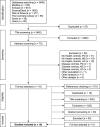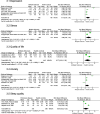The impact of the COVID-19 pandemic on neuropsychiatric and sleep disorders, and quality of life in individuals with neurodegenerative and demyelinating diseases: a systematic review and meta-analysis of observational studies
- PMID: 37046209
- PMCID: PMC10091330
- DOI: 10.1186/s12883-023-03176-9
The impact of the COVID-19 pandemic on neuropsychiatric and sleep disorders, and quality of life in individuals with neurodegenerative and demyelinating diseases: a systematic review and meta-analysis of observational studies
Abstract
Background: The coronavirus disease 2019 (COVID-19) pandemic has affected the mental health, sleep and quality of life, especially in individuals with chronic disease. Therefore, the purpose of this systematic review and meta-analysis was to investigate the impact of the COVID-19 pandemic on neuropsychiatric disorders (depression, anxiety, stress), sleep disorders (sleep quality, insomnia) and quality of life in individuals with Parkinson's disease (PD), Multiple Sclerosis (MS) and Alzheimer's disease (AD) compared to healthy controls.
Methods: Seven databases (Medline, Embase, ScienceDirect, Web of Science, The Cochrane Library, Scielo and Lilacs) were searched between March 2020 and December 2022. Observational studies (i.e., cross-sectional, case-control, cohort) were included. GRADE approach was used to assess the quality of evidence and strength of the recommendation. Effect size was calculated using standardized mean differences (SMD; random effects model). A customized Downs and Black checklist was used to assess the risk of bias.
Results: Eighteen studies (PD = 7, MS = 11) were included. A total of 627 individuals with PD (healthy controls = 857) and 3923 individuals with MS (healthy controls = 2432) were analyzed. Twelve studies (PD = 4, MS = 8) were included in the meta-analysis. Individuals with PD had significantly elevated levels of depression (very low evidence, SMD = 0.40, p = 0.04) and stress (very low evidence, SMD = 0.60, p < 0.0001). There was no difference in anxiety (p = 0.08). Individuals with MS had significantly higher levels of depression (very low evidence, SMD = 0.73, p = 0.007) and stress (low evidence, SMD = 0.69, p = 0.03) and low quality of life (very low evidence, SMD = 0.77, p = 0.006). There was no difference in anxiety (p = 0.05) and sleep quality (p = 0.13). It was not possible to synthesize evidence in individuals with AD and sleep disorder (insomnia).
Conclusion: In general, the COVID-19 pandemic negatively impacted individuals with PD and MS. Individuals with PD showed significantly higher levels of depression and stress; and individuals with MS presented significantly higher depression and stress levels, as well as significantly lower quality of life when compared to healthy controls. Further studies are needed to investigate the impact of the COVID-19 pandemic in individuals with AD.
Keywords: Alzheimer disease; COVID-19; Meta-analysis; Multiple sclerosis; Parkinson disease; Systematic review.
© 2023. The Author(s).
Conflict of interest statement
The authors declare that they have no competing interests.
Figures



Similar articles
-
Investigation on sleep and mental health of patients with Parkinson's disease during the Coronavirus disease 2019 pandemic.Sleep Med. 2020 Nov;75:428-433. doi: 10.1016/j.sleep.2020.09.011. Epub 2020 Sep 10. Sleep Med. 2020. PMID: 32980664 Free PMC article.
-
Impact of the COVID-19 pandemic on the mental health of hospital staff: An umbrella review of 44 meta-analyses.Int J Nurs Stud. 2022 Jul;131:104272. doi: 10.1016/j.ijnurstu.2022.104272. Epub 2022 Apr 27. Int J Nurs Stud. 2022. PMID: 35576637 Free PMC article.
-
Subjective sleep dysfunction and insomnia symptoms in Parkinson's disease: Insights from a cross-sectional evaluation of the French CoPark cohort.Parkinsonism Relat Disord. 2015 Nov;21(11):1323-9. doi: 10.1016/j.parkreldis.2015.09.025. Epub 2015 Sep 10. Parkinsonism Relat Disord. 2015. PMID: 26411501
-
The psychological impact of Covid-19 pandemic on people with Multiple Sclerosis: A meta-analysis.Mult Scler Relat Disord. 2022 May;61:103774. doi: 10.1016/j.msard.2022.103774. Epub 2022 Mar 25. Mult Scler Relat Disord. 2022. PMID: 35381533 Free PMC article. Review.
-
Effects of non-drug interventions on depression, anxiety and sleep in COVID-19 patients: a systematic review and meta-analysis.Eur Rev Med Pharmacol Sci. 2021 Jan;25(2):1087-1096. doi: 10.26355/eurrev_202101_24679. Eur Rev Med Pharmacol Sci. 2021. PMID: 33577065
Cited by
-
The effects of occupational disruption during COVID-19 lockdowns on health: a cross-sectional study.PeerJ. 2024 Jun 26;12:e17594. doi: 10.7717/peerj.17594. eCollection 2024. PeerJ. 2024. PMID: 38948220 Free PMC article.
-
From Night to Light: A Bibliometric Analysis of the Global Research Trajectory of Sleep Disorders in Parkinson's Disease.J Multidiscip Healthc. 2025 Jan 30;18:473-492. doi: 10.2147/JMDH.S503849. eCollection 2025. J Multidiscip Healthc. 2025. PMID: 39902191 Free PMC article.
-
SARS-CoV-2 Infection and Alpha-Synucleinopathies: Potential Links and Underlying Mechanisms.Int J Mol Sci. 2024 Nov 10;25(22):12079. doi: 10.3390/ijms252212079. Int J Mol Sci. 2024. PMID: 39596147 Free PMC article. Review.
References
-
- World Health Organization. Statement on the second meeting of the international health regulations (2005) emergency committee regarding the outbreak of novel coronavírus (2019-nCoV). 2020. https://www.who.int/news-room/detail/30-01-2020-statement-on-the-second-...). Accessed 15 Mar 2022.
-
- Pathak N, Vimal SK, Tandon I, Agrawal L, Hongyi C, Bhattacharyya S. Neurodegenerative disorders of Alzheimer, Parkinsonism, Amyotrophic Lateral Sclerosis and Multiple Sclerosis: an early diagnostic approach for precision treatment. Metab Brain Dis. 2022;37:67–104. doi: 10.1007/s11011-021-00800-w. - DOI - PubMed
Publication types
MeSH terms
LinkOut - more resources
Full Text Sources
Medical

